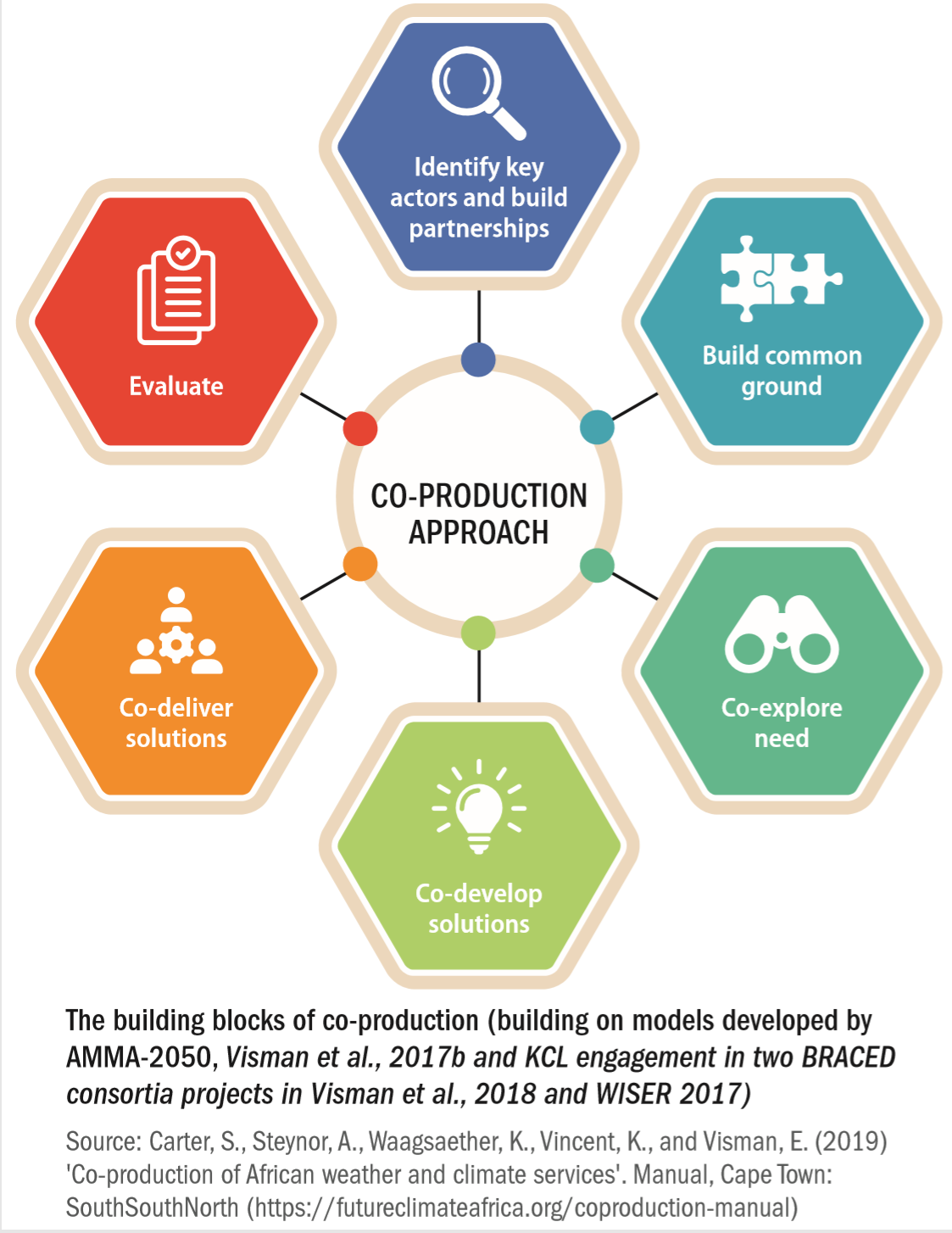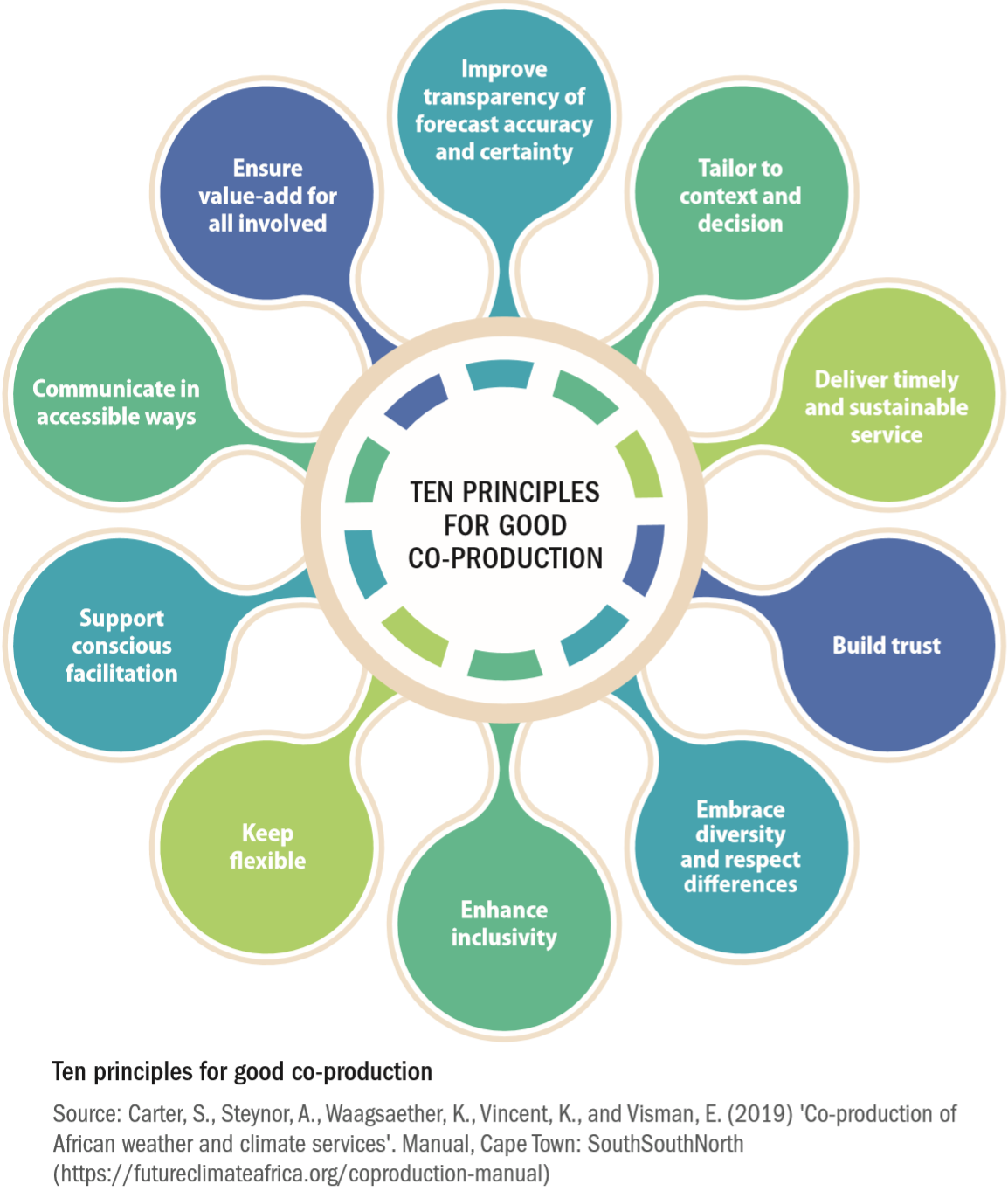New manual on co-producing African weather and climate services
New manual on co-producing African weather and climate services
A newly launched manual by WISER (Weather and Climate Information Services in Africa) and Future Climate for Africa supports producers of climate services to work more effectively with the users of their information – for more climate-resilient development.
The key to a co-production approach is bringing together the producers of weather and climate information with those who use the information to make decisions, often using intermediaries to help connect these actors, in order to solve a problem where weather and climate information is relevant. A number of donors are encouraging the use of co-production to drive further improvements in weather and climate services.
The manual outlines six building blocks in the co-production process. These building blocks do not need to be followed sequentially. Co-production can be used for different purposes. As a result, co-production can be used in all, or some, building blocks depending on the problem to be addressed. Most research projects will involve users in the identification of research questions but not always in the co-development of solutions step, for example.
Explore the building blocks of climate services co-production below or download the image by clicking here.
This manual has devised a simple spectrum of co-production approaches, made up of consultative and immersive co-production:
- Consultative co-production is best suited for problems that are pre-defined and co-production is often limited to specific building blocks.
- Immersive co-production is best suited for exploration of problems where the outcome is flexible and might require a series of engagements to understand and solve problems.
Co-production is often a resource intensive process and needs to be adequately supported both in terms of funding and time. However, the added value from taking a co-production approach can result in significant benefits:
• Co-production ensures that climate information is tailored to a specific context, and is therefore more likely to be valuable to the user.
• Co-production brings people together, which can create synergies and opportunities for resource sharing and creative thinking on cost effectiveness.
• Co-production ensures a wider reach and impact through multiple communication channels, engaging intermediaries and users, and improves the tailoring of communication to specific audiences.
• Co-production and joint ownership promotes integration of climate information into actions and likewise into plans and budgets.
• Co-production creates a virtuous cycle: investment in capacities to co-produce better, more relevant products and information, and enable more user-focused communication, leads to better understanding, use and benefits; which contributes to resilient livelihoods and economic development; and ultimately increases demand for more and better climate information.
The manual identifies ten principles for good co-production that have been drawn together from learning from a number of recent programmes including WISER: Weather and Climate Services for Africa, BRACED: Building Resilience and Adaptation to Climate Extremes and Disasters and FCFA: Future Climate for Africa.
Explore the Ten principles for good co-production below or download the image by clicking here.
There is growing evidence that co-production of weather and climate services can result in improved outcomes. For example, in the WISER Strengthening Climate Information Partnerships-East Africa (SCIPEA) project, co-production determined that the timing of seasonal forecasts was too late to be useful to farmers. The communities that embrace these kinds of initiatives see a substantial improvement in crop yields (WISER, 2019). The FCFA programme also shows that the co-production process, in and of itself, can be beneficial in building trust and laying the foundations for further collaboration. For instance, in the FRACTAL project, the relationships built between researchers and city officials have already resulted in additional collaborative projects such as climate change think tanks and additional research on climate change health impacts in Mozambique.
Read the full manual in digital form or download the pdf: A manual for co-production in African climate and weather services.
Watch the recording of the recent webinar, where the manual's co-authors describe and illustrate the principles of good co-production in more depth:
Image (top right): credit Red Cross Red Crescent Climate Centre.


